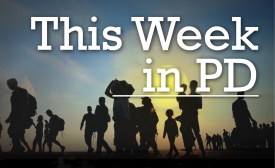womens rights

PD News headlines focused on the role of public diplomacy in empowering vulnerable populations.
During his recent unannounced visit to Afghanistan, U.S. Secretary of State John Kerry met with prominent female entrepreneurs and the captain of the women’s soccer team to discuss the hard-won progress of Afghan women and their uncertain future. Like his predecessor, Secretary Kerry has admirably pledged to prioritize women’s rights in his foreign policy agenda.
The Pakistani teenager who survived an assassination attempt and inspired a worldwide movement for girls' education will soon become a published author. Malala Yousafzai, 15, says she wants her book, "I Am Malala," to reveal and help children across the world who still struggle to get to school.
Last night was one big sister act at the Woodrow Wilson International Center for Scholars.The center’s first female leader, Jane Harman, jokingly referred to Anita McBride, the former chief of staff to Laura Bush, as her “little sister.” McBride is now executive in residence at American University’s School of Public Affairs. Harman is the center’s director, chief executive and president.
The Fall issue of PDiN Monitor focuses on Women in Public Diplomacy with feature articles by Michele Bachelet, Director of UN Women, and Melanne Verveer, Ambassador-at-Large for Global Women's Issues. These articles address two recent initiatives that have brought women's rights to the forefront of international policies and diplomacy.
In London, two Saudi women are set to participate in the Olympics today. But back in Saudi Arabia, millions of women and girls are effectively banned from practicing sports inside the Kingdom. Also, they aren't allowed to drive, although there is no law stipulating that.
Secretary of State Hillary Clinton surprised the Pakistani women by asking to see them, and squeezed in nearly 15 minutes for them last Friday. As the women lined up for a photo with Clinton, she sprung another surprise by suddenly stepping out of the line and talking to her “Amn-o-Nisa sisters.”
Through a cultural diplomacy program sponsored by the U.S. Embassy in Cairo, she helped some of Northern Africa’s most talented vocalists take a brave and historic step: singing in public. In some parts of the region, women are not only discouraged from singing...







